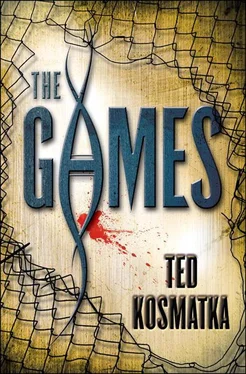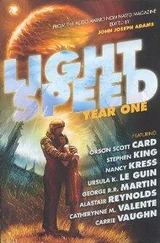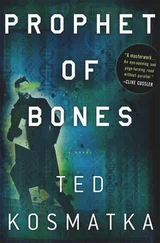He walked toward Silas’s car. It was only ten steps, but Silas had time to run ten different scenarios through his head. He should run. He should fight. He should play dumb. Maybe the guy just wanted him to move his car. He’d been parked in the same spot for a while now.
Silas heard the click of the cop’s boots, a sound peeling away like a paint chip from the massive generalized noise of his surroundings, becoming specific. A bus rumbled past. Bored faces in the windows.
Two gloved knuckles rapped on his window. Silas rolled the window down.
“Yeah?”
“You’ve been parked here for too long.” In Silas’s experience, by mid-career, cops came in two varieties, hard and soft. This one was big, youngish, already tending toward the doughy stereotype. Eyes like dark circles in a pale, puffy face. “This is for drop-off only.”
“Sorry, officer, I’m waiting on my wife. In and out, she told me. The agency screwed up our return tickets, and she’s getting it straightened out before we leave. But I’ll keep circling.” Silas put a hand on his gearshift, but the cop’s voice stopped him.
“I’ve seen your face somewhere.”
Silas didn’t say anything. The cop bent, looking hard in his face, then up and down at the car.
“Yeah,” the cop said. “TV, I think.”
Silas could see the wheels turning just beneath the man’s dark eyes.
“Did you used to play for the Heat?”
Silas didn’t even hesitate. “No, the Wizards. Can hardly call it playing, though. I rode the bench, mostly, but it’s nice to know there’s a few people who still recognize me.”
“I never really followed the Wizards.”
“Well, must have been an away game you saw.”
“Yeah, that must be it. What position?”
“Power forward, mostly, but like I said, I was a bench jockey.”
“Been retired long?”
“A good ten years.”
“Funny, I could have sworn I saw you recently. Like just a few weeks ago.”
Those wheels were turning faster now.
“What’s your name?”
“Jay Brown. Want an autograph?”
“Naw, that’s okay.” He straightened up. “You can stay here a few more minutes, but after that, move it along. I don’t care if your wife’s here or not. A lot of people could use this space.”
“Yes, officer.”
The cop gave him a long parting look before he turned.
He’s not sure if he believes me .
The gritty sounds of his footfalls faded into the background noise again.
He’ll check my plate when he’s back in his car. No doubt about it .
Then the passenger door of Silas’s car burst open, and Vidonia sank into the seat.
Silas had the car in drive almost before the door was closed. He groped his way into deep traffic, thankful for it for the first time in his life.
“What was that about?” Vidonia asked.
“About ten years off my life, I’d say.”
“I saw him standing there, so I waited.”
“Did you get it?”
“Yeah.”
“What took so long?”
“Look at this place. There are a million people here, and nobody knows where anything is. I had to walk about two miles inside the terminal.”
“What should I be looking for?”
“Lot C-forty-three.”
As Silas drove, he kept checking his rearview for police lights. None followed.
Eighteen minutes later, he pulled to a stop at a booth. He showed the paperwork to the bored attendant and slid through. They stopped halfway down the long bank of cars.
Silas eyed her incredulously. “This is it?”
“Yeah.”
“A subcompact?”
“You wanted inconspicuous.”
Vidonia climbed out of Silas’s vehicle and stepped around to the squat, navy blue Quarto. A stylish sports car it was not. It had the aerodynamic properties of a diaper. She keyed open the door and climbed in. Moments later came the soft whir of an electric motor.
He pulled his car forward, and she followed him out of the rental lot, circling back toward the heart of the airport. At the long-term parking lot, he bought an extended pass and parked midway down a middle aisle. He stood, and as he looked around at the sea of cars, he couldn’t help but smile. A vehicle—even one like his—could go unnoticed for a very long time in a place like this.
When he climbed into the cramped Quarto, Vidonia smiled at his attempts to get comfortable. Even with the seat pushed all the way back, his knees almost touched the dashboard.
She pulled away, headed back toward the highway.
“How long till they catch on?” she asked.
“Long enough. We don’t need a lot of time, one way or the other.”
Tears flowed freely down Evan’s face. He wasn’t blubbering, wasn’t making any sound at all. But the tears still slid quietly down his cheeks and dripped from his quivering chin, making a dark spot on his shirt. The sheer beauty of what he was looking at was too much for him to take in at one time. His senses were overloaded.
“You’re right, Pea,” he said, and his voice was a cracked whisper.
The boy loomed larger in the screen now, older by years than he had been just a few hours earlier. His chest was broadening, taking on a new muscular topography. The legs had lengthened. Arms thickened. The boy-face now annealed into something more. And Evan could feel the energy still growing. He was overwhelmed with a sense that Pea was … becoming.
The lighting panels in the ceiling surged suddenly, brightening the room. Then they darkened, almost going out. A moment later, the light surged again, brighter, and this time Evan heard a bulb pop somewhere.
Pea smiled, and Evan knew that if he looked too long, he would go mad. He would go out of his mind, losing himself in the image before him, with no hope of ever finding his way back.
You can look a god in the face, he’d discovered. But only briefly. And looking changes you.
The world behind Pea came into focus. The grayness was gone, replaced by sea and sand, and a golden sun in a blue sky. Pea raised his arms and closed his eyes. The arms were too long, abstractions of what arms could be. They reached for miles into the sky, curling into claws.
The lights surged again, and this time, it was like a camera flash. The glowing ceiling panels exploded one by one, showering Evan in sparks and bits of broken glass and melted plastic.
The room went dark except for the glowing screen.
Pea smiled.
Outside the window, the streetlight popped, sending little runnels of blue flame arcing into the night. The air was greasy with the tang of smoldering electronics. In the distance behind him, Evan heard a fire alarm sounding, warbling higher and higher until it screeched itself silent.
The only sound now was the crashing of waves. Pea’s sun the only light.
THREE HUNDRED fifty miles away, at that exact moment, on a console on the second floor of the Western Nuclear Control Hub, a small red indicator bulb began to flash. Years ago, when the monitoring system was first being designed, some engineer had decided that the importance of this particular indicator justified it being given its own flashy red bulb rather than a mere screen icon. No sound accompanied the pulsing indicator; and precisely because it was small and because the technician wasn’t accustomed to looking for it, a few moments passed before the technician noticed.
When he did notice, he sat up straighter in his chair. His brow furrowed, and he looked around for a supervisor, unsure of what exactly was expected of him. He’d never seen that bulb flash before. Or any bulb, come to think of it. The screen icons occasionally lit up, but never the bulbs on the console.
Then another bulb began to flash. And another.
Читать дальше












